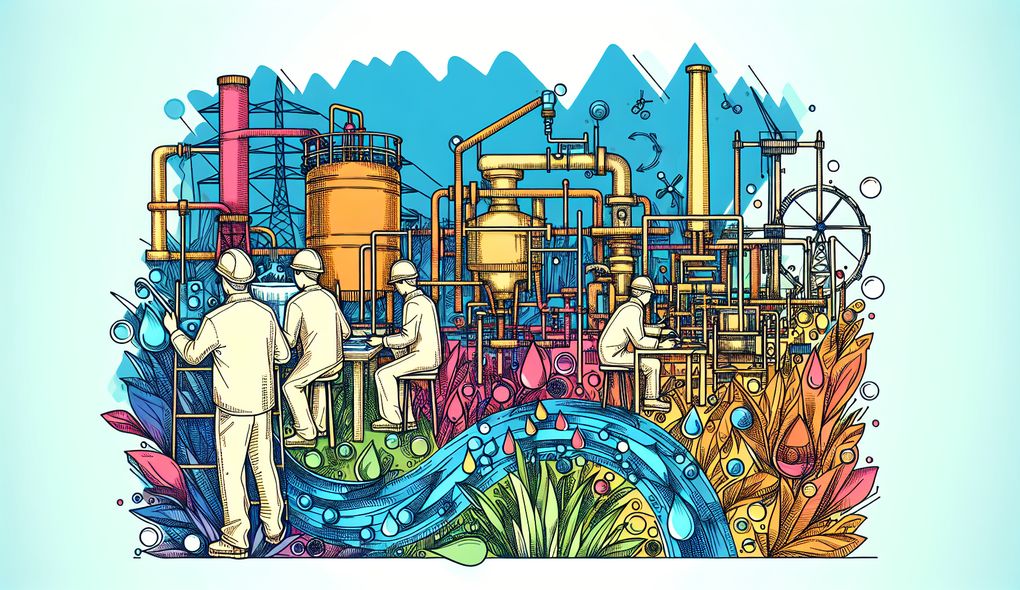What is your understanding of hydrology, hydraulics, and other water-related sciences?
INTERMEDIATE LEVEL

Sample answer to the question:
Hydrology, hydraulics, and other water-related sciences are essential fields for understanding the behavior and management of water resources. Hydrology focuses on the study of water in the environment, including its distribution, movement, and properties. Hydraulics deals with the flow and control of water in pipes, channels, and other structures. Other water-related sciences encompass areas such as water quality, water treatment, and water resource management. These knowledge areas are crucial for a Water Resource Engineer to assess, design, and manage projects related to water supply, wastewater treatment, flood control, and water management in an environmentally sustainable manner.
Here is a more solid answer:
As a Water Resource Engineer, my understanding of hydrology, hydraulics, and other water-related sciences is extensive. Hydrology involves studying the behavior of water in various environments, including rainfall patterns, watershed analysis, and evapotranspiration. I am proficient in conducting hydrological analyses using software like HEC-HMS and SWMM to determine water flow rates, peak flows, and runoff volumes. Additionally, I have experience in hydraulic design, where I apply principles to design and optimize water supply systems, wastewater treatment facilities, and flood control structures. I am adept at using software like HEC-RAS to model and simulate hydraulic systems. Lastly, my knowledge extends to other water-related sciences such as water quality analysis, water treatment methods, and water resource management practices to ensure sustainable engineering solutions. By combining these skills, I can effectively assess, design, and manage water resource projects in compliance with environmental regulations and industry best practices.
Why is this a more solid answer?
The solid answer demonstrates a deeper understanding of hydrology, hydraulics, and other water-related sciences, providing specific examples of the candidate's experience using relevant software and applying principles to design and optimize systems. However, it could be further improved by including more details about the candidate's knowledge of sustainable engineering practices and design methods.
An example of a exceptional answer:
Hydrology, hydraulics, and other water-related sciences are at the core of my expertise as a Water Resource Engineer. In hydrology, I have conducted extensive studies on the movement and behavior of water, including analyzing rainfall data, calculating streamflow using various methods like the Rational Method and NRCS-CN method, and analyzing watershed characteristics. In hydraulic design, I have designed water supply and distribution systems, considering factors such as pressure, flow rates, and pipe sizing. I have also designed and optimized flood management structures, using advanced software like HEC-RAS to simulate and analyze flood scenarios to ensure optimal performance. My knowledge of water-related sciences extends to water quality analysis, where I have conducted studies on water treatment methods, including physical, chemical, and biological processes, to ensure safe and potable water. Additionally, I am well-versed in sustainable engineering practices, applying techniques like Low Impact Development (LID) and green infrastructure to design environmentally friendly water management solutions. Overall, my comprehensive understanding of hydrology, hydraulics, and other water-related sciences enables me to execute water resource projects with efficiency, sustainability, and regulatory compliance.
Why is this an exceptional answer?
The exceptional answer showcases the candidate's extensive experience and expertise in hydrology, hydraulics, and other water-related sciences. It provides specific details about the candidate's work in analyzing rainfall data, calculating streamflow, designing water supply and distribution systems, optimizing flood management structures, and conducting water quality analysis. It also highlights the candidate's knowledge of sustainable engineering practices and design methods, such as Low Impact Development and green infrastructure. This answer demonstrates the candidate's ability to apply their knowledge and skills to execute water resource projects effectively.
How to prepare for this question:
- Review the fundamental principles of hydrology and hydraulics, including rainfall analysis, streamflow calculations, and hydraulic design concepts.
- Familiarize yourself with popular water resource management software such as HEC-RAS, HEC-HMS, and SWMM.
- Stay updated with the latest industry trends and technologies in water resource engineering, including advancements in water modeling and environmental regulations.
- Research and understand sustainable engineering practices and design methods, such as Low Impact Development and green infrastructure.
- Prepare examples from past projects that demonstrate your knowledge and expertise in hydrology, hydraulics, and other water-related sciences.
What are interviewers evaluating with this question?
- Knowledge of hydrology, hydraulics, and other water-related sciences

